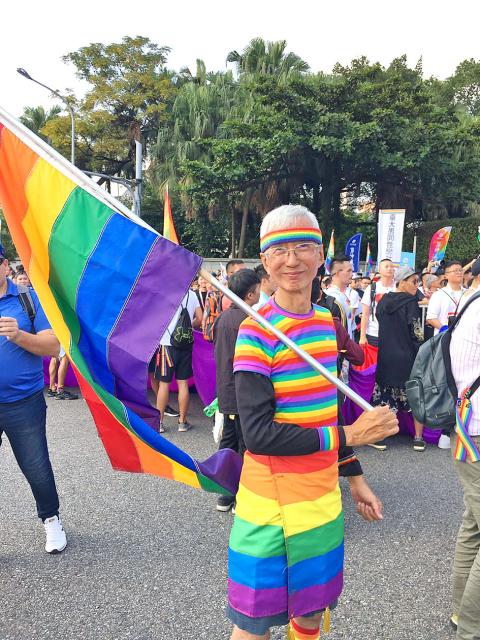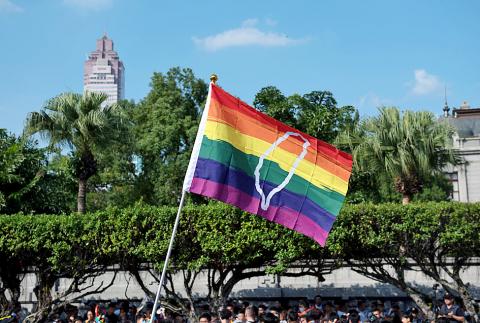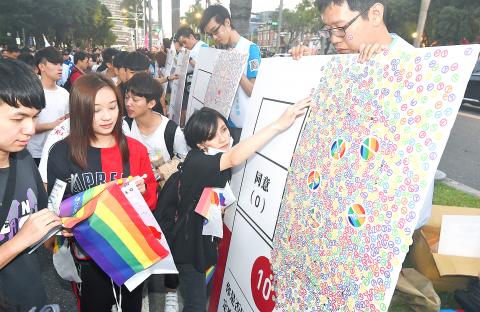Nearly 140,000 people from home and abroad yesterday marched through the streets of Taipei in support of better protection of lesbian, gay, bisexual and transgender (LGBT) rights, calling on Taiwanese voters to “vote for equality” in the five LGBT-related referendums tied to next month’s local elections.
Taipei’s skies were filled with rainbow flags, as participants departed from Ketagalan Boulevard at 2:30pm and headed in three different directions, before congregating back on the boulevard.
According to the rally’s organizers, Taiwan LGBT Pride, the march, now in its 16th year, attracted about 137,000 people, up from last year’s 123,000.

Photo: CNA
Due to the annual parade’s growing popularity in Asia and the world, there has been increasing racial, age and occupational diversity among the participants, the organizers said.
The theme this year was “Tell your story, vote for equality,” as the organizers wanted to draw attention to the importance of gender equality education, while urging young Taiwanese to vote in the referendums on Nov. 24 “to safeguard the rainbow,” said a Taiwan LGBT Pride Community general coordinator, who only identified himself as “Hsiao Pai” (小白).
The five referendums, three of which were initiated by anti-LGBT groups, could decide whether the government would legalize same-sex marriage and whether LGBT-inclusive education will be taught in elementary and junior-high schools.

Photo: Yang Mian-chieh, Taipei Times
Mickey Liu (柳皓恩), 26, who joined the march from Hsinchu, said his parents have known he is gay since he was 19.
“When they found out, our relationship went through a rough period. However, as they learned more about the LGBT community, they came to understand and accept it,” Liu said.
A 48-year-old Japanese man who declined to disclose his name said that he came to Taiwan just for the parade and that he found Taiwanese to be “very nice and open” to people with different sexual orientations.

Photo: EPA / Dave Mark Meguiso
Asked whether he hopes to attend such a parade in his country one day, he said that Japan “is not there yet.”
Liam Arne, a 22-year-old American who has been living in Taiwan for three months, said he is happy to see the progress the nation has made in improving LGBT rights.
European Economic and Trade Office Director Madeleine Majorenko said it was her fourth time attending the Taiwan LGBT Pride Parade, which she called “the greatest party ever.”

Photo: CNA
British Representative to Taiwan Catherine Nettleton said Taiwan is a progressive society in various aspects, with a thriving democracy and media.
She said she hopes the progress made on the issue of marriage equality will evolve into a solid result.
German Institute Taipei Director-General Thomas Prinz said the parade alone is a symbol for a free and democratic society, adding that changes take time and that Taiwan is headed in the right direction.

Photo: Liao Chen-huei, Taipei Times
Prior to the start of the parade, more than 30 church leaders, pastors and theologians from 13 nations, including the US, the Philippines, India, South Korea and Singapore, gathered on the boulevard to voice support for the nation’s lesbian, gay, bisexual, transgender, intersex and questioning (LGBTIQ) community, expressing the hope that the nation sets an example by liberating people who are being oppressed due to their sexual orientation.
The participants included US bishop Yvette Flunder, Malaysian Pastor Ngeo Boon Lin, who is Asia’s first openly gay clergy member with a doctorate in theology, Japanese transgender priest Ambrosia Goto Kaori and Indian intersex social activist Daniel Medonca.
Flunder said people would know that the spirit of God is upon them when they choose to liberate people from bondage, choose relationships over religion, and set people free instead of putting them in chains.
“To all of those who are suffering from the oppression of the church, let me be a witness to you today... I have been in a relationship with my partner for 34 years. She and I got married in the US as soon as we could,” Flunder said.
The participants read out a statement expressing their belief that the heart of the gospel of Jesus Christ is radical love, justice and inclusion, and that each person is precious to God because they are all created in His image.
“We recognize there are people with diverse sexual orientations, gender identities, gender expressions and sex characteristics. We affirm that being LGBTIQ is not a psychological disorder, a mental illness, immoral, evil, sinful or depraved — it is simply a reflection of the amazing diversity that God has created,” they said.
Taiwan LGBT Family Rights Advocacy executive secretary Li Jui-ping (黎璿萍) said that she has been a Christian since junior-high school.
"However, I later left the church because after the pastor found out about my sexuality, he told my parents that I was abnormal,” Li said.
Despite the incident, Li said she has remained a Christian because what she believes in is Jesus Christ and that through him, she sees a family.

Taiwan is projected to lose a working-age population of about 6.67 million people in two waves of retirement in the coming years, as the nation confronts accelerating demographic decline and a shortage of younger workers to take their place, the Ministry of the Interior said. Taiwan experienced its largest baby boom between 1958 and 1966, when the population grew by 3.78 million, followed by a second surge of 2.89 million between 1976 and 1982, ministry data showed. In 2023, the first of those baby boom generations — those born in the late 1950s and early 1960s — began to enter retirement, triggering

ECONOMIC BOOST: Should the more than 23 million people eligible for the NT$10,000 handouts spend them the same way as in 2023, GDP could rise 0.5 percent, an official said Universal cash handouts of NT$10,000 (US$330) are to be disbursed late next month at the earliest — including to permanent residents and foreign residents married to Taiwanese — pending legislative approval, the Ministry of Finance said yesterday. The Executive Yuan yesterday approved the Special Act for Strengthening Economic, Social and National Security Resilience in Response to International Circumstances (因應國際情勢強化經濟社會及民生國安韌性特別條例). The NT$550 billion special budget includes NT$236 billion for the cash handouts, plus an additional NT$20 billion set aside as reserve funds, expected to be used to support industries. Handouts might begin one month after the bill is promulgated and would be completed within

The National Development Council (NDC) yesterday unveiled details of new regulations that ease restrictions on foreigners working or living in Taiwan, as part of a bid to attract skilled workers from abroad. The regulations, which could go into effect in the first quarter of next year, stem from amendments to the Act for the Recruitment and Employment of Foreign Professionals (外國專業人才延攬及僱用法) passed by lawmakers on Aug. 29. Students categorized as “overseas compatriots” would be allowed to stay and work in Taiwan in the two years after their graduation without obtaining additional permits, doing away with the evaluation process that is currently required,

IMPORTANT BACKER: China seeks to expel US influence from the Indo-Pacific region and supplant Washington as the global leader, MAC Minister Chiu Chui-cheng said China is preparing for war to seize Taiwan, Mainland Affairs Council (MAC) Minister Chiu Chui-cheng (邱垂正) said in Washington on Friday, warning that Taiwan’s fall would trigger a regional “domino effect” endangering US security. In a speech titled “Maintaining the Peaceful and Stable Status Quo Across the Taiwan Strait is in Line with the Shared Interests of Taiwan and the United States,” Chiu said Taiwan’s strategic importance is “closely tied” to US interests. Geopolitically, Taiwan sits in a “core position” in the first island chain — an arc stretching from Japan, through Taiwan and the Philippines, to Borneo, which is shared by